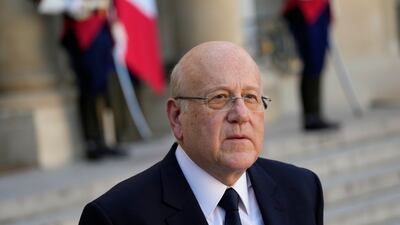Financial experts were cautiously upbeat after Lebanon’s new prime minister set out his plan to salvage the country’s economy.
But they said putting the much-needed reforms into practice would be a challenge.
On Monday, Najib Mikati said he would pursue a deal with the International Monetary Fund and discuss the scale of the country’s losses with Lazard, a financial services company.
He also presented a comprehensive plan to protect small depositors, whose money has been frozen in crippled Lebanese banks.
Mr Mikati assumed the post of prime minister last month, after political bickering left Lebanon without a government for a year.
In an interview with local broadcaster LBCI, he promised to provide a “more realistic plan to get out of this crisis we are in” but said a long road lay ahead.
He said an IMF deal – the best way to access international aid – would not be likely before the end of the year, but that he planned to meet representatives from Lazard within days.
The company has previously put the scale of financial losses at more than $80 billion. This figure was disputed by high-street lenders and Lebanon’s central bank.
The former government of Hassan Diab hit a wall in talks with the IMF after Parliament, the Central Bank and commercial banks opposed the financial rescue plan he put forward on Lazard’s advice.
“The fact that they contacted Lazard is good news,” Saeb El Zein, an emerging markets specialist and former managing director of several banks and investment funds, told The National.
He pointed out that Mr Mikati’s deputy prime minister, Saadeh Al Shami, an ex-IMF official, is expected to sit on the government’s committee to tackle the crisis. The body’s agenda will be discussed at the Cabinet session on Wednesday.
Mr Zein, however, cautions that there are major challenges ahead to stabilise the nation’s finances.
“How will the government reconcile views among the committee’s members with regards to the IMF’s assessment of losses, which were in line with Lazard’s estimates?” Mr El Zein asked.
The IMF and the wider international community have insisted that Lebanon must make certain reforms be made before financial assistance will be forthcoming.
These include a capital control law, a state budget and a resolution to reform the banking sector, Mr El Zein said.
Whether the country's parliament brings in such measures is a concern, given its track record on that front, he said.
MPs previously disputed Lazard’s assessment of Lebanon’s financial losses, when it was put forward by Mr Diab, and Parliament has not passed a capital control law.
Mr El Zein said that the longer reforms are delayed, the greater the loss to the state. He said millions of dollars were being squandered on subsidising imports when they could be invested in a healthy financial recovery plan.
Mr Mikati, a billionaire businessman, promised his Cabinet would seek to protect small depositors against financial losses.
“The priority is to protect small depositors and their access to fresh dollars,” he said. “Concerned parties must assume their duties and distribute losses in a fair manner among all.”
Lebanese banks have put strict limits on how much depositors can withdraw in US dollars and the Lebanese pound. The latter currency, officially pegged to the dollar at 1,507, has lost more than 90 per cent of its value since late 2019.
The crisis prompted Lebanon’s first default, in 2020, and has plunged more than half of the population into poverty.
The World Bank described the situation as one of the top three financial crises globally since the 1850s.
Ibrahim Jamali, an associate professor of finance at the American University of Beirut, said it was too early to say whether the government would succeed.
He said success would depend on what financial recovery plan the government eventually adopts and that its decision to engage with international financial bodies was positive.
“The government has first to recognise losses and engage creditors,” he said.
He sounded a warning that they faced a tight window to make progress before parliamentary elections are held.
Jihad El Hokayem, an economist and lecturer at several Lebanese universities, said it was unlikely the government could make a deal with the IMF before the poll, which is scheduled for next year.
But, he said, the lack of a comprehensive rescue plan should not stop officials from taking immediate steps to ease the burden of the crisis.
One measure he suggested was for the Central Bank to revise bank criteria for withdrawals to boost small depositors’ access to their savings.
“Any financial plan should also include compensating small depositors who already withdrew the bulk of their savings at a loss,” he said.












